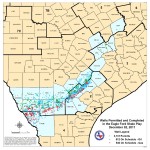Hard Times Come to the ‘Hotel Capital’

Jorge Sanhueza-Lyon
Small town Cotulla depends on the oil industry to bring people to fill its many hotel rooms.Jorge Sanhueza-LyonJose Rodriguez is recently laid off from his oil industry job.
This story originally ran as part of KUT 90.5’s series “Meanwhile in Small Town Texas.”
Cotulla, Texas, is a small town deep in the oil fields of the South Texas Eagle Ford Shale.
It’s a town that bet big on the oil boom.
Five years ago the census put the population at less than 4,000 people. There were three or four motels then. Now in Cotulla there are around 25 motels, hotels and inns. It’s earned the town a nickname: “The ‘Hotel Capital of the Eagle Shale,’” says City Administrator Larry Dovalina.
He says for years Cotulla was like a lot of places in rural Texas: “Dying on the vine. Kind of forgotten.”
Then one day, Dovalina got a surprising proposal. A man approached him about building a $3 million Best Western Hotel in Cotulla.
“He said there’s a big oil boom coming. And I heard about it from a friend of mine, who was also an investor in his business. And from then on, it’s gone up every year,” says Dovalina.
The city laid down utilities and gave out permits for the Best Western and other new hotels. The buildings housed the thousands of men rushing in to work in the oil fields, and Cotulla reaped the benefits of the motel tax. To Dovalina, the whole thing looked like progress for the community.

Mose Buchele
Cotulla native Jose Rodriguez had lost his oilfield job earlier this year. He was thinking about leaving town.
“Many of its children who had left now enjoy very stable, very strong paying jobs,” he says. “Which they were never going to be able to enjoy in the community on the vine, dying, like it was before.”
That’s one version of the story of Cotulla, or almost any Texas boom town. It’s a version we heard more of before the price of oil plummeted last year.
Just down the street from City Hall, a young guy working on his car, Jose Rodriguez, tells a different version.
“I’ve been here all my life,” he says. “[The] 2010 oil field boom hit here pretty good. Since then it’s been booming in Cotulla, man. But just in the past couple of months, it went down, you know? Everybody got laid off. Everybody who’s anybody is laid off right now. I’m laid off, as a matter of fact.”
Rodriguez says he has a line on a new oil rig job, but if that didn’t pan out, he was going to leave. He says lot of the guys he knew already had — to Canada, or Alaska.
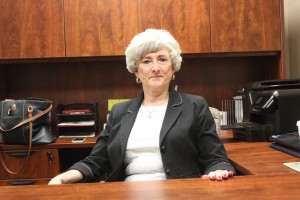
Mose Buchele
Brenda Talbert is in charge of the county chamber of commerce. She thinks oil prices are will rebound soon.
“I think by ten years from now, this town’s gonna be dried out. Every hole’s gonna be poked around here, and there’s only gonna be a handful of companies around here,” he says. “I don’t know, man. Cotulla don’t look too good right now.”
Cotulla’s about more than just oil and motels, of course.
There’s art. There’s local music — like El Gusano, a Cotulla-based band from the ‘70s. There’s loads of history: Before he was President, Lyndon Johnson taught grade school here. The place is overflowing with stories. But when you ask people about the future, you usually hear a version of the “boom town” story — or “ghost town.”
All you have to do is ask them about the hotels.
Ronaldo Osario, who goes by his nickname Wheaties — he says he got it because he was so good at basketball as a kid, his teammates said he should be on the Wheaties cereal box — works at the auto parts store where Rodriguez was shopping.
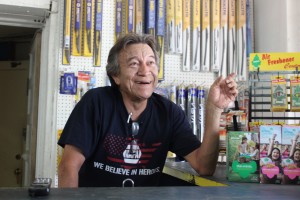
Mose Buchele
'We've been through this before says Ronaldo "Wheaties" Osario. He worries the new hotels will become "homes for the pigeons."
Wheaties was here for last oil boom in the ‘80s, and the bust. He says repo men would follow him on his paper route to locate their targets.
“We’ve been through this before. We know how it works,” he says.
He says that in ten years, the hotels are “gonna be pigeon houses.”
But, take that to the local chamber of commerce, and you get the sense that you’re stepping on some invisible battle lines.
“A lot of the people in this community did not want progress. But the progression came in just due to the fact that they couldn’t hold back the oil and gas boom,” says chamber president Brenda Talbert.
“I’m a positive person,” she says. “I’m not a negative person. I think this is a very positive thing.”
She says the price of oil will rebound. The U.S. will start exporting natural gas, maybe even crude oil. Soon the city will need more hotels.
She agrees that 25-plus hotels in a tiny town is slightly “nuts.”
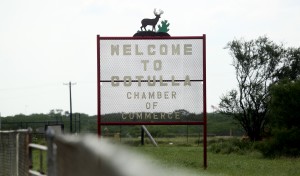
Jorge Sanhueza-Lyon
Before the oil boom Cotulla was known mostly for hunting and ranching.
“But when you look at the overall picture, and if you drive around, especially at night when these service people are coming in, most of those parking lots are full.”
But Later that night, most of those parking lots were still pretty empty.
That includes the lot at the Best Western — the place that was the first to go up with the oil boom.
Katie Groda works for a company that manages hotels. She actually spends her life on the road living in different hotels, and she’s spent a lot of time in Cotulla..
“As you can see there’s no business in here right now, and as I just came off the frontage road, I’m watching contractors building two-, three-story hotels!”
At the height of the oil boom, she says the place was booked two years out. Companies were paying for empty rooms to have them in case they needed them.
“You couldn’t find parking. The hotel was full, our housekeepers…everybody was just booming and going 24-7.”
Now, she says, it’s “extremely quiet.”

Mose Buchele
With less business coming in and so many hotels, Katie Groda hopes the city has plans for empty buildings.
Since the oil companies started making layoffs and cutting spending, there have been rate wars between the hotels. And Groda doesn’t see how lot of the places will survive.
“What’s going to happen to the city of Cotulla? Are all those going to be dilapidated buildings in the next two, three, four years? Is that what the town’s going to be left with?”
There’s a train that passes through downtown Cotulla.
It carries goods made in Mexico to cities on this side of the border. One idea here is to capture that traffic by building big warehouses for the goods and filling the hotels with long-haul truckers. People also talk about repurposing the buildings — Cotulla needs permanent housing, so that could be an option.
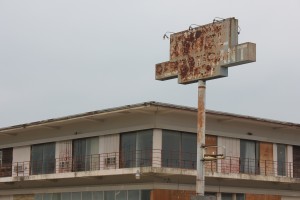
Mose Buchele
In downtown Cotulla, an empty hotel from a bygone era serves as a warning to some.
But only one thing seems sure: Even if oil keeps going up, it’s not likely Texas will soon return to the heady days of a year or two ago. That means there are hundreds — maybe thousands — of other small towns like Cotulla, wondering what comes next.
In downtown Cotulla along Main Street, a rusted-out sign sits in front of a motor lodge that looks like it was abandoned long ago.
The windows are dingy. The paint’s chipping off.
There haven’t been any guests here for a long time. There are no pigeons, but there are swallows. They’ve built their nests under the balcony.
